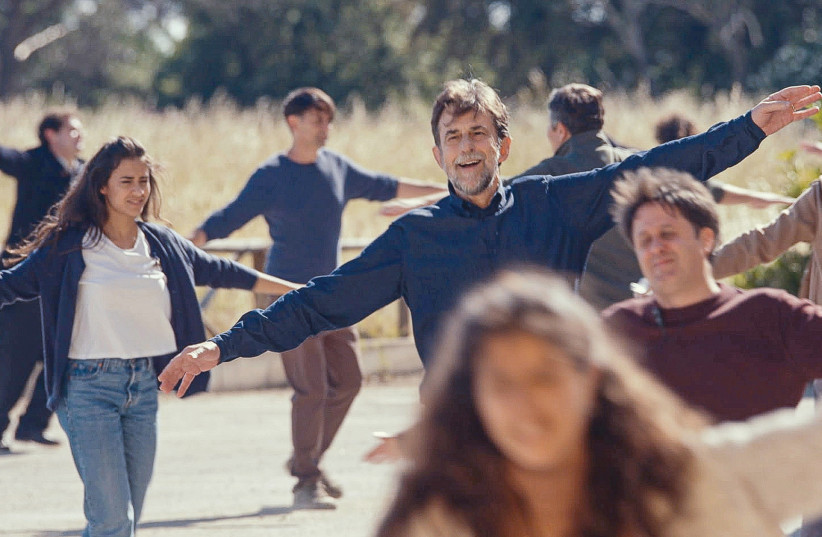Nanni Moretti’s latest movie, A Brighter Tomorrow, which opened in Israel on Thursday (in Italian with English subtitles), ends with some nice music and a sophisticated political joke. It’s a fitting coda to a thoroughly enjoyable movie, a rare film that will make you think and feel good, at the same time.
Arthouse audiences have long known and loved Moretti, whose 2001 film, The Son’s Room, about the sudden death of a young man and how his family copes, won the Palme d’Or, the top prize at the Cannes Film Festival. His movies range from comedy to drama, and he has made such acclaimed films as Habemus Papam (We Have a Pope), about a cardinal who freaks out when he is elected pope and goes into therapy, and Mia Madre, about a busy movie director trying to be there for her Latin teacher mother, who is dying. No matter what the subject of his films, they are that prized commodity: serious enough for you to identify with the characters, but humorous enough to give you some laughs, and quirky enough to be memorable. You may even leave them feeling like you can look at life in a different way.
This is very much true of A Brighter Tomorrow. It’s in the great tradition of movies about directors shooting a movie and how their personal and professional lives collide, and you may notice echoes of Federico Fellini’s 8 ½ or Francois Truffaut’s Day for Night.
A director's search for a happy ending
But A Brighter Tomorrow is a more low-key look at a director and his crises at home and on the set. Giovanni, the director, is played by Moretti himself, who acts in almost all of his movies, but here it’s especially clear that he is playing a character based on himself. He has just started shooting a new movie, a period piece about a group of Italian Communists in Rome in 1956, just as the Soviet Union tanks rumble into Hungary – and also at the moment when a Hungarian circus shows up to perform in Italy. As Giovanni quickly learns, many younger people, among them some of his actors, don’t really grasp the history and don’t even know that there was once an influential Italian Communist political party. It’s just one sign that Giovanni may be losing his touch.
Another is that Paola (Margherita Buy, a luminous actress who has appeared in many of Moretti’s films), his wife and producer, has chosen to divide her time between his film and an action movie set in Italy but financed by Koreans. It’s the first time she is producing a movie by someone else. But far worse, and far more threatening to Giovanni’s precarious equilibrium, Paola is seeing a therapist whom she hopes will help her find the courage to leave Giovanni. She still loves him, but she is worn down by his childishness and neediness.

Giovanni has a ritual on the night of the first day’s shooting that he feels brings luck to all his productions. It involves watching a specific Anouk Aimee movie with his wife and daughter and eating a special dessert, but he is disheartened when both women have to leave early or take phone calls. His daughter, who is composing the score for his films, is busy with a new boyfriend, who turns out to be very different from what Giovanni imagines and he can’t understand what she sees in him.
Back on set, Vera (Barbora Bobulova), the actress who plays the lead in the movie, wants to forget the politics and throw herself at Ennio (Silvio Orlando, another Moretti regular), the actor playing the Communist Party official she is working with.
At the same time, the production is threatened because Pierre (Mathieu Amalric), the enthusiastic, but slightly shady French producer, may be having a financial meltdown. Giovanni is forced to go to Netflix looking for more money to continue filming, where he is confronted by smug executives who recite the fact that Netflix is seen in 190 countries as if it is a mantra that confers upon them superpowers of decision-making, and they tell him his movie lacks a “WTF moment.”
When he visits the set of Paola’s action movie, which features an action-packed climax Netflix would surely approve of, he finds the action shallow and uncinematic – and stops the filming to give them a lesson from various artists he brings in to try to improve it, keeping them awake all night and pushing Paola further away.
As all this goes on, he starts thinking about the movies he wishes he was making, like an adaptation of John Cheever’s The Swimmer, and another film, a romantic, wistful look at the life of a couple told through songs. There are several musical interludes where the characters burst into song, although the film isn’t a real musical, and Giovanni starts having flashbacks to the early days of his marriage. It becomes clear that he is, in a roundabout way, making that musical film about the couple, even as he tries to tell a story of Italy in the 50s.
Giovanni is both vain and insecure, childish and commanding, and creative and obtuse. He wants the world to embrace him while he pushes it away, beginning to understand that he may no longer be able to connect with the audience – and his wife – the way he used to.
He can be an annoying character, but watching him stumble and find moments of grace may make you more aware of the ways in which you yourself can be difficult and you may identify both with him and his exasperated wife, as they search for a happy ending.
